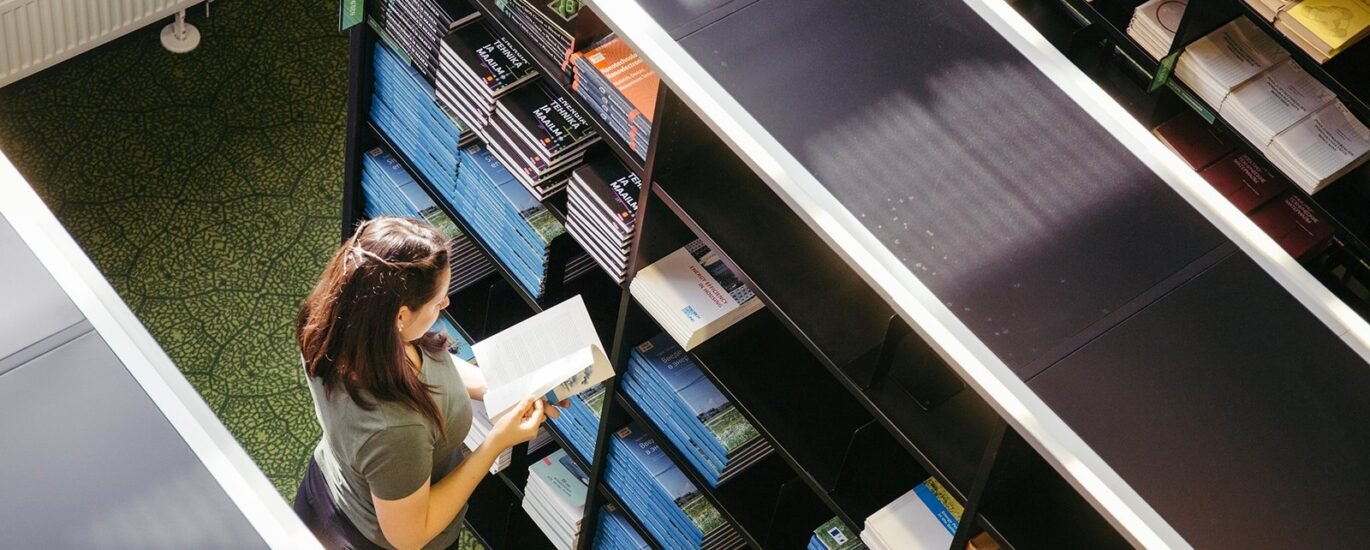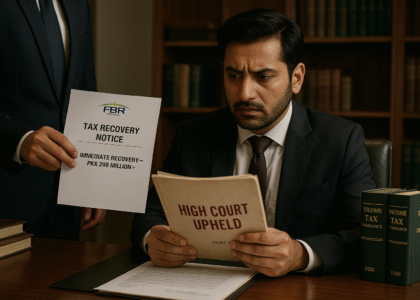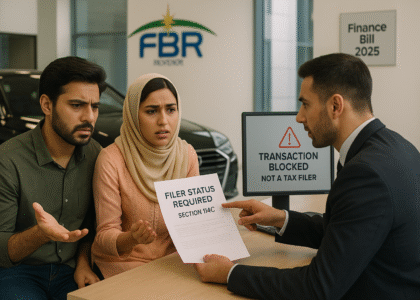Edit with Elementor
Guide to Tax Record-Keeping under Section 174 of Pakistan’s Income Tax Ordinance, 2001
The Importance of Tax Record-Keeping for Compliance in Pakistan
Maintaining accurate tax records is essential for every taxpayer in Pakistan. Section 174 of the Income Tax Ordinance, 2001, clearly outlines the records and documentation each taxpayer must retain to ensure compliance and reduce the risk of disallowed deductions. This guide simplifies the requirements and offers practical advice on how to keep tax records that meet the legal standards, using examples to address common taxpayer concerns.
Whether you’re a business owner, self-employed, or managing a small enterprise, having well-organized tax records can help you avoid potential issues with audits and claims for deductions. Here’s a complete breakdown to make this process easier.
Section 174 Explained: Understanding the Essentials of Record-Keeping
According to Section 174, every taxpayer is obligated to maintain specific records unless otherwise directed by the Commissioner. Let’s break down the main requirements of this section:
- Mandatory Record-Keeping: Taxpayers must keep accounts, documents, and records as specified. These include but are not limited to:
- Receipts for business transactions
- Proof of income and expenses
- Records of assets, liabilities, and capital investments
- Retention Period: Tax records should be kept for at least six years after the end of the tax year they pertain to.
- Example: If a tax year ends on June 30, 2024, all records for that year should be retained until June 30, 2030.
What Counts as “Deduction” for Tax Purposes?
Section 174(4) specifies that “deduction” encompasses amounts listed in trading accounts, manufacturing accounts, and profit and loss accounts. Failure to retain the required documentation may result in the Commissioner disallowing or reducing deductions.
Example: Suppose a business claims a deduction for office expenses but fails to provide receipts or evidence upon request. The Commissioner may reduce or disallow this deduction, impacting the company’s taxable income.
Maintaining Records Beyond Six Years: When is it Required?
For pending cases or proceedings, taxpayers must keep records until a final decision is made. This includes any assessment, appeal, or court action.
Practical Tips for Effective Tax Record-Keeping
-
Organize Digital and Physical Records: Use a secure filing system for physical records and a digital backup. Digital tools or accounting software can streamline record management.
-
Use an Electronic Tax Register (ETR): As per Section 174(5), the Commissioner may require an Electronic Tax Register (ETR) to store transaction data. This system helps maintain detailed records and meets audit standards.
-
Retain Supporting Documents: It’s critical to keep all relevant documents to back up transactions. For example, retain invoices, bills, bank statements, payroll records, and any contracts associated with your business.
- Example: If you paid a contractor for services, keep the contract, payment receipt, and any communication showing the nature of the services provided.
Frequently Asked Questions (FAQs) About Tax Record-Keeping
Q1. What types of records do I need to maintain as a taxpayer?
Taxpayers must keep detailed records of income, expenses, assets, liabilities, and transactions relevant to tax filings, including receipts, invoices, contracts, and bank statements.
Q2. How long must I retain my tax records?
Tax records should be retained for six years from the end of the tax year they relate to, unless ongoing legal proceedings require extended retention.
Q3. What if I don’t have receipts for some transactions?
If receipts or documentation are missing, the Commissioner may disallow or reduce your deductions. Keeping a clear record of all expenses is essential for compliance.
Q4. What does “deduction” mean in the context of Section 174?
Deduction includes any amount recorded in trading accounts, manufacturing accounts, or profit and loss accounts as a business expense.
Q5. Do small businesses need to keep records for six years as well?
Yes, all businesses, regardless of size, must keep tax records for six years unless otherwise directed by the Commissioner.
Q6. Are electronic copies of documents acceptable as records?
Yes, digital copies are generally acceptable. However, it’s recommended to have both physical and digital copies for thorough record-keeping.
Q7. What is an Electronic Tax Register (ETR), and do I need one?
An ETR is a digital device that stores transaction data for tax purposes. The Commissioner may require businesses to install and use an ETR for accurate tax reporting.
Q8. What should I do if my records are damaged or lost?
Try to recover or recreate the records, such as requesting duplicate receipts. Without proper documentation, deductions may be challenged.
Q9. Are there specific formats for maintaining these records?
While there’s flexibility in format, records should be clear, organized, and easily accessible. Using accounting software can streamline this process.
Q10. Do I need to keep records of personal expenses?
Only business-related or taxable income records are required. Personal expenses generally don’t need to be documented unless they’re part of your tax claims.
Q11. Can I discard records once the six-year period ends?
Yes, you can discard records after six years if no proceedings are pending. However, it’s best to confirm that all audits or assessments are complete.
Q12. How can I ensure my records meet audit standards?
Keep all relevant documents organized, use clear descriptions, and ensure that all transactions have supporting evidence such as receipts or contracts.
Q13. What happens if I am selected for an audit but lack certain records?
If records are missing, the Commissioner may question deductions and potentially issue a tax adjustment. Complete and accurate records minimize audit risk.
Q14. Are bank statements alone enough to prove business expenses?
No, bank statements should be accompanied by receipts or invoices for each expense, as statements alone don’t show the details of each transaction.
Q15. Do I need to keep records for zero-income years?
Yes, it’s still advisable to keep records, as they may be required for future audits or to confirm tax compliance.
Q16. What is considered “reasonable cause” for not providing certain records?
Reasonable cause may include situations like natural disasters, technical failures, or other unavoidable events. However, these cases are assessed individually.
Q17. Should I retain records for transactions conducted outside Pakistan?
Yes, if they impact your Pakistan tax liability. Overseas transactions relevant to your tax filings in Pakistan should be documented and retained.
Q18. Are there penalties for not keeping records as required?
Yes, failure to maintain proper records can result in disallowed deductions, tax adjustments, and potential penalties during audits.
Q19. How should I store sensitive records securely?
Store records in secure, backed-up digital files and physical locations to protect them from damage or unauthorized access.
Q20. Who can help me set up a compliant record-keeping system?
Accountants, tax advisors, and financial consultants can provide professional guidance on setting up a system that meets Section 174 requirements.






